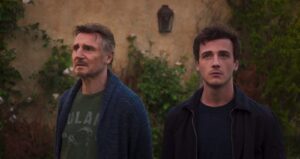Made in Italy
Posted on August 13, 2020 at 5:14 pm
B-| Lowest Recommended Age: | High School |
| MPAA Rating: | Rated R for language |
| Profanity: | Some strong language |
| Alcohol/ Drugs: | Some alcohol |
| Violence/ Scariness: | References to sad offscreen death, divorce, family conflict |
| Diversity Issues: | None |
| Date Released to Theaters: | August 8, 2020 |
| Date Released to DVD: | December 7, 2020 |

Like the characters they play, Liam Neeson (Robert) and his son Micheál Richardson (Jack) experienced the devastating loss of a wife and mother, actress Natasha Richardson (Micheál uses her last name as a tribute). This adds an overlay of intimacy to the film would not be supported by the script alone, a first-time feature written and directed by actor James D’Arcy. It is perhaps for that reason that a climactic scene of grief is truncated and underplayed. Maybe it is because it was just too painful. Or the shifting and uncertain tone of the film, which wants to be warm-hearted, romantic, comic, and dramatically emotional at the same time.
Jack manages an art gallery owned by the family of the wife who is divorcing him. When she tells him they are going to sell the gallery, he insists he will buy it. “The gallery is my home,” he says. He cannot let it go. But to get the money he needs he will have to sell his late mother’s home in Tuscany, deserted for twenty years because it was too painful to return. And he will have to get his father to agree. They are barely on speaking terms. Jack has contempt for his father’s failure to produce any new artwork in years and for his irresponsible attitude. Jack arrives to take him on the trip and Robert has not packed (“I thought it was tomorrow”) and, in one of the movie’s most regrettable cliches, cannot remember the name of the woman who spent the night. Robert does not respect Jack. Again, regrettably, he puts it this way: “Those who can, do. Those who can’t run their wive’s galleries.”
The house is a beautiful mess. The landscape around it is breathtaking. Robert calls it “one of the most fabulous convergences of nature ever,” and dismisses Jack’s referring to it as “the view.” And they disagree about a mural Robert painted on one of the walls, which he calls his tribute to abstract expressionist Franz Kline, but looks more like a tribute to the blood-tsunami elevator in “The Shining.”
There is a brisk British real estate agent with a severe haircut (Lindsay Duncan), who brings a delightful mix of disdain and saleswomanship to every scene she’s in, at least until her character has to soften up when she is charmed by Robert. There’s a warmhearted local woman (Valeria Bilello) who is there to soften up Jack. These women and the experience of living in and working with the home of the woman they are still grieving makes it possible for them to do what they have never done before: talk about their loss in a scene that is not as emotionally resonant as the film sets us up to expect. Maybe it is just be British reticence.
But then we return to the real heart of the film, the spectacularly gorgeous Tuscan scenery and oh, that food. That setting, and the genuine affection between Neeson and Richardson, makes up for the predictability of the script. What do you think, with the potential buyers be kind, considerate people who deeply appreciate the house as it is or a poor copy of the self-centered boors Kristen Wiig and Jason Sudeikis used to play on “Saturday Night Live?” It’s the fabulous convergence of nature and the almost-fabulous convergence of the actors that makes it worth a watch.
Parents should know that this movie concerns a tragic death, survivor guilt, and family estrangement. Characters use strong language and there is a mild sexual situation.
Family discussion: Why wouldn’t Jack sign the divorce papers? Why was the gallery so important to him? Why couldn’t Jack and Robert be honest with one another?
If you like this, try: “Under the Tuscan Sun,” “Life as a House,” and “Enchanted April”
